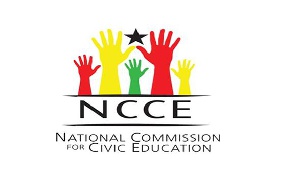The National Commission for Civic Education (NCCE) in Ghana, entrusted with the responsibility of enlightening citizens about their rights, obligations, and democratic participation, has faced criticisms for its inability to effectively carry out its core mandates.
In addition to its struggles with adequately addressing election-related matters, NCCE Ghana has encountered challenges in raising public awareness of citizen rights, leading to ongoing ignorance-driven violations.
This article critically examines these shortcomings while proposing viable solutions for a more proactive and impactful role for the NCCE.
Failing to fulfill the core mandate of educating Ghanaians on their rights:
NCCE's pivotal role lies in providing citizens with an understanding of their rights and responsibilities. However, the Commission's efforts in this regard have not yielded the desired outcomes. A significant portion of the population remains uninformed about their fundamental rights, impeding their ability to engage meaningfully in civic matters and address instances of rights infringement.
Limited engagement beyond election-related concerns:
The visibility of NCCE predominantly surges during election periods, overshadowing its potential to influence civic education throughout the year. While disseminating election-related information is important, it constrains the Commission's reach and impact to a specific timeframe. This hampers its capacity to educate citizens about broader democratic principles that underpin daily life.
Ongoing violations of citizens' rights due to ignorance:
NCCE's inability to effectively impart knowledge about citizens' rights has contributed to the perpetuation of rights violations. Many Ghanaians experience rights breaches without recognizing them as such, often due to a lack of awareness about legal protections. This vicious cycle of ignorance and violation underscores the pressing need for sustained civic education.
Lack of a consistent weekly program for civic education:
The absence of a dedicated platform for consistent civic education on television and radio is a glaring gap in NCCE's approach. Instituting a weekly program would allow for a structured dissemination of information across a wide array of topics. This regular engagement could gradually elevate public consciousness and encourage a culture of active participation.
Proposing remedies for progress:
To address these shortcomings and position NCCE Ghana for a more impactful future, the following strategies are recommended:
Diversification of content:
Expanding the scope of education beyond elections to encompass various aspects of citizenship, such as human rights, gender equity, and environmental responsibility, can foster a more holistic understanding among citizens.
Integration into formal education:
Collaborating with educational institutions to integrate civic education into school curricula would ensure that every generation is equipped with the necessary knowledge for informed and responsible citizenship.
Leverage digital platforms:
Embracing digital platforms and social media can augment the Commission's reach. Engaging multimedia content and interactive formats can effectively communicate information to a tech-savvy audience.
Grassroots outreach:
Establishing local NCCE chapters can facilitate tailored education initiatives, workshops, and community discussions, allowing citizens to grasp the relevance of civic education within their unique contexts.
Collaborative endeavors:
Forging partnerships with NGOs, media houses, and civil society organizations can amplify the impact of civic education campaigns, pooling resources and expertise for greater outreach.
Vigilant stance on rights violations:
NCCE should adopt a proactive approach to addressing rights violations. Empowering citizens to report breaches and collaborating with relevant authorities can ensure a more robust response to rights infringements.
In conclusion, NCCE Ghana's challenges in effectively educating citizens about their rights, limited engagement beyond elections, and the persistence of rights violations due to ignorance demand immediate attention. By adopting innovative strategies and expanding its purview, NCCE can evolve into a formidable force for fostering informed and active citizenship, ultimately ensuring the protection and fulfillment of citizens' rights.
Opinions of Tuesday, 12 September 2023
Columnist: Francis Mawutor Datenu
Unveiling the shortcomings of NCCE Ghana: An in-depth assessment of missed opportunities
Entertainment














